Key takeaways:
- Marine biodiversity loss is influenced by pollution, climate change, and overfishing, impacting entire ecosystems and human livelihoods.
- Ocean conservation is essential for sustaining biodiversity, regulating climate, and supporting coastal communities that rely on marine resources.
- Personal engagement in conservation efforts, such as beach cleanups and advocating for sustainable seafood, can drive collective responsibility and awareness.
- Storytelling and social media play vital roles in inspiring action and raising awareness about the importance of protecting marine environments.
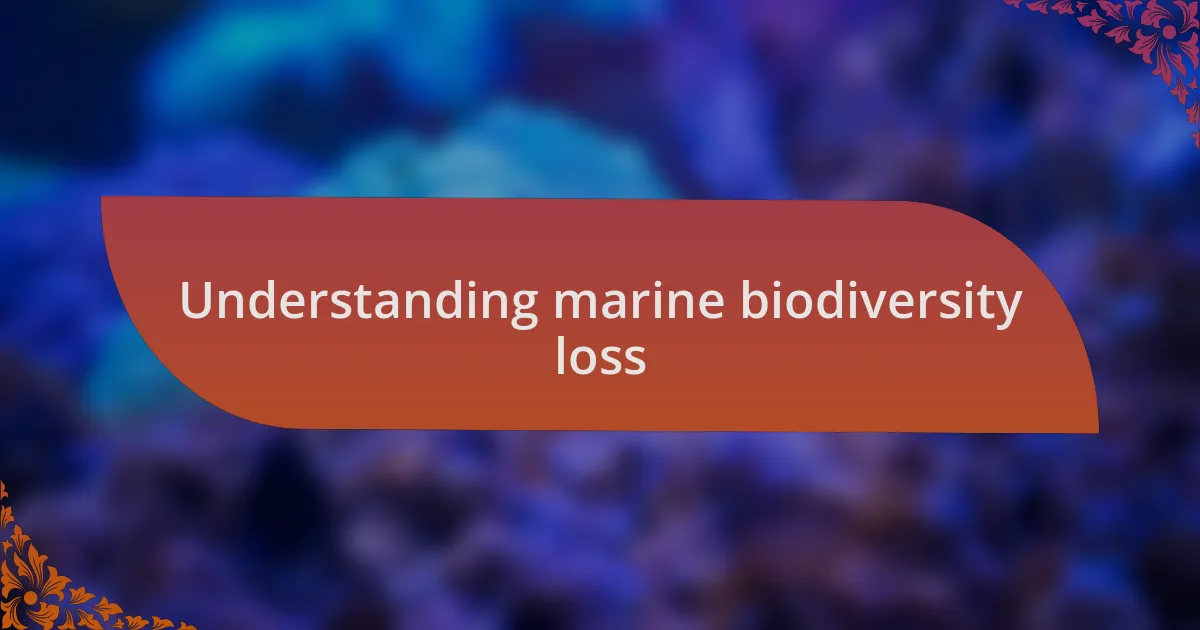
Understanding marine biodiversity loss
Marine biodiversity loss is a critical issue that often feels abstract until you witness its impact firsthand. I remember standing on a beach littered with plastic, a stark reminder of how human activity can devastate fragile ecosystems. It raises the question: what happens to the colorful life beneath the waves when their habitat is choked with pollution?
When we think of biodiversity, we often imagine a thriving underwater world teeming with various species. Yet, every day, countless marine organisms are pushed closer to extinction due to that same pollution, climate change, and overfishing. I recall diving in a vibrant coral reef, and the colors, movements, and sounds were exhilarating. Now, I ponder how many reefs like that are disappearing before future generations even have the chance to experience them.
The complexity of marine biodiversity cannot be overstated. Each species plays an intricate role in the ecosystem, akin to moving parts in a finely tuned machine. When one part is affected, it can trigger a chain reaction that impacts other species and the environment. Reflecting on this interconnectedness, I ask myself, what sort of legacy do we want to leave for the oceans?
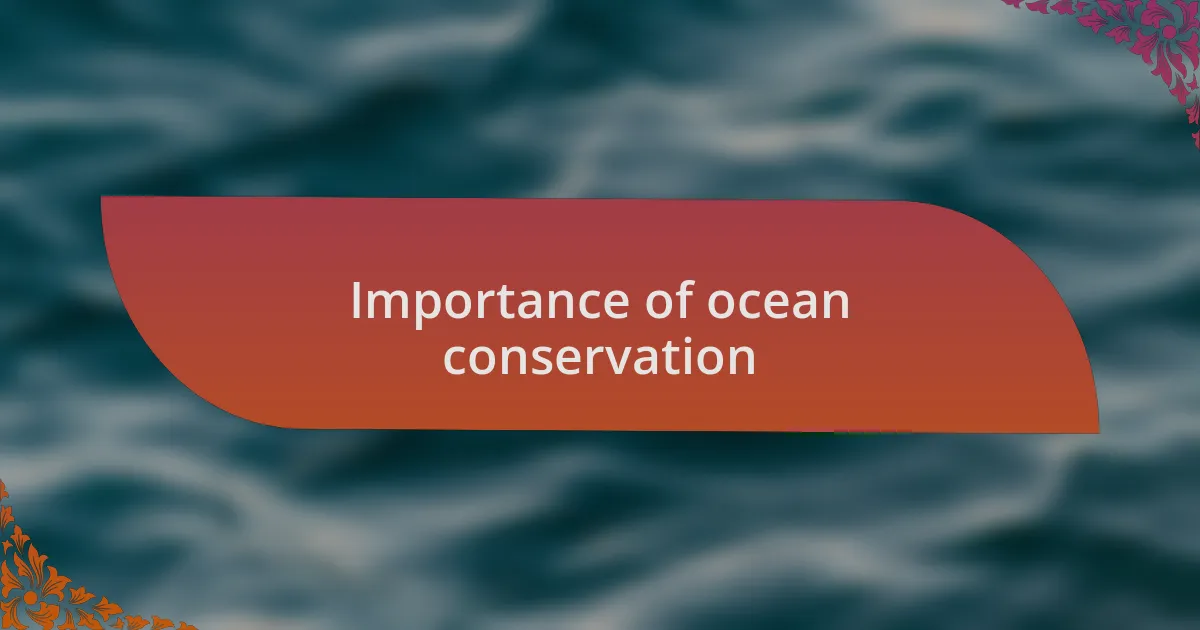
Importance of ocean conservation
Ocean conservation is vital because it safeguards not only the habitats of countless marine species but also the overall health of our planet. I recall a time kayaking through a mangrove forest, where the air was thick with the scent of salt and life. That experience underscored for me that these ecosystems act as nurseries for many fish populations, supporting both biodiversity and fishing industries.
Moreover, protecting our oceans is essential for regulating the climate. I remember attending a seminar where a marine biologist passionately explained how oceans absorb a significant amount of carbon dioxide. It made me realize that without healthy oceans, we may be risking our ability to combat climate change effectively. Isn’t it alarming to think that our survival could hinge on how well we care for the waters we often take for granted?
Lastly, the cultural and economic importance of oceans cannot be overlooked. I think about the coastal communities that depend on fishing for their livelihoods. When marine life diminishes, it’s not just an ecological issue; it’s also a human one that directly affects families. How can we justify ignoring this urgent call for conservation when so many lives are intertwined with the health of our oceans?
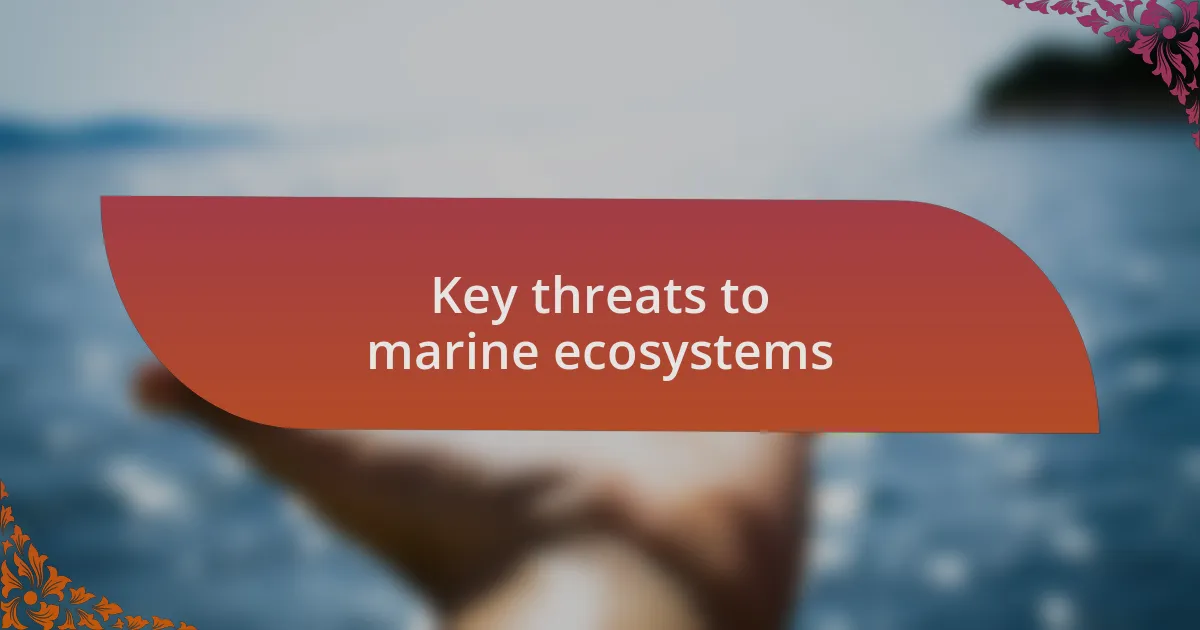
Key threats to marine ecosystems
One of the most significant threats to marine ecosystems is plastic pollution. I clearly remember the shock of seeing a turtle struggling to free itself from a plastic bag while snorkeling. It’s an unsettling reminder that our single-use habits have tangible consequences in the ocean. What strikes me is that tiny fragments of plastic, or microplastics, are now found in the most remote marine areas. How can we continue to turn a blind eye to this crisis?
Overfishing also looms large as a key threat, disrupting intricate food webs and depleting species that are essential for ecological balance. I once spoke to a fisherman who lamented the noticeable decline in his catch over the years. His frustration resonated with me, highlighting how unsustainable practices damage not just fish populations but entire marine communities. How can we expect future generations to enjoy thriving oceans when we’re stripping them bare today?
Lastly, climate change is an overarching threat that is triggering ocean acidification and rising temperatures, pushing marine life to their limits. I recall watching coral bleaching while diving in the Great Barrier Reef, a sight that filled me with both awe and concern. The vibrant colors dimmed, leaving stark reminders of a fragile ecosystem suffering due to our carbon emissions. Is it not our responsibility to consider how our actions today will transform the ocean landscape tomorrow?
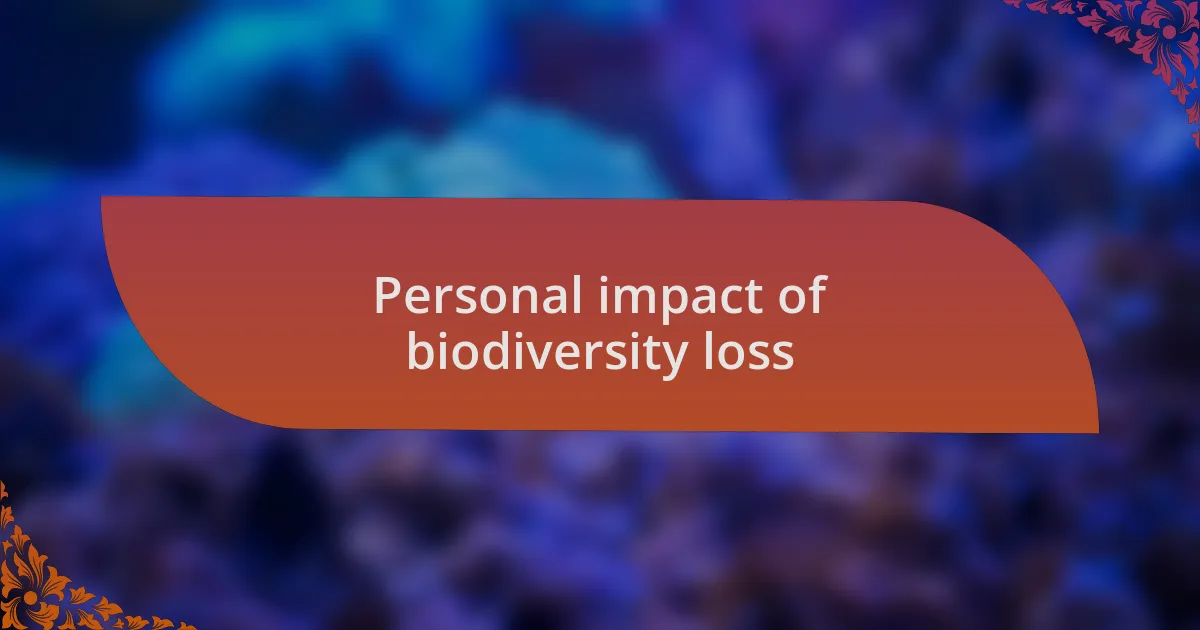
Personal impact of biodiversity loss
Experiencing biodiversity loss in our oceans has deeply affected my connection to marine life. I remember a trip to a beautiful coastal area where vibrant coral reefs once teemed with colorful fish. Swimming in the same waters years later, I found the reefs bleached and barren, a stark contrast that left me feeling helpless. How can we justify such a profound loss of beauty and life?
The personal impacts extend beyond visuals; they touch our souls. On a recent kayaking trip, I paddled through an area once alive with playful dolphins. To my dismay, we encountered only silence. That absence felt heavy, a haunting reminder of what we’re losing. When I think about it, I can’t help but ponder: what will future experiences look like if we continue on this path?
Reflecting on these moments, I realize that marine biodiversity loss is not only an environmental issue, but a deeply personal one. Each species lost feels like a part of our collective ocean heritage slipping away. Whether it’s the thrill of spotting a unique creature or the joy of sharing stories about ocean adventures, these experiences shape our appreciation for nature. Isn’t it time we advocate for the oceans, not just for the ecosystems but for the memories and connections we could lose?
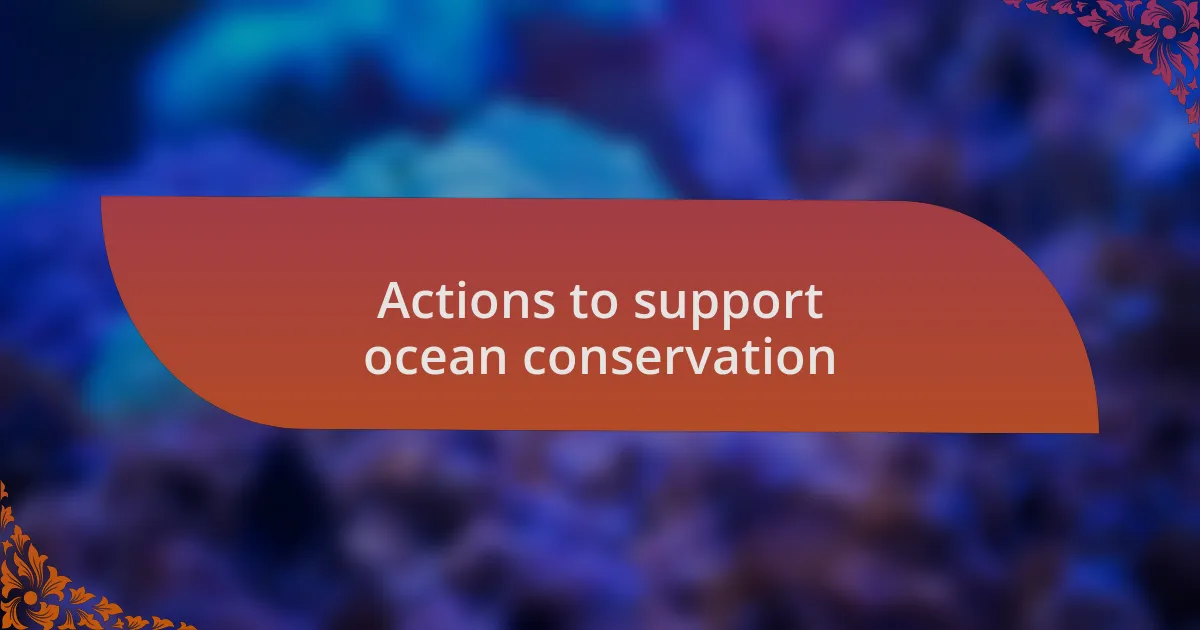
Actions to support ocean conservation
Taking action for ocean conservation starts with small, personal commitments. I vividly remember initiating a beach cleanup with friends after noticing all the plastic litter on our favorite stretch of sand. That day was a turning point; not only did it clear our beloved beach, but it also deepened my understanding of our collective responsibility for preserving marine spaces.
Another impactful step is supporting sustainable seafood. In my journey, I’ve become more mindful of the choices I make at grocery stores and restaurants. Have you ever thought about where your fish comes from? Knowing that I’m choosing sustainably sourced seafood not only helps combat overfishing but also encourages better practices in the fishing industry. It empowers me, knowing every meal can make a difference.
Lastly, advocacy plays a crucial role in ocean conservation. I often find myself participating in local policy discussions or campaigns that focus on marine protection. It’s amazing how passionate voices can rally communities and influence change. Have you considered how your voice can contribute to this dialogue? By sharing our stories, we invite others to join us in safeguarding our oceans for future generations, reinforcing the idea that every action counts.
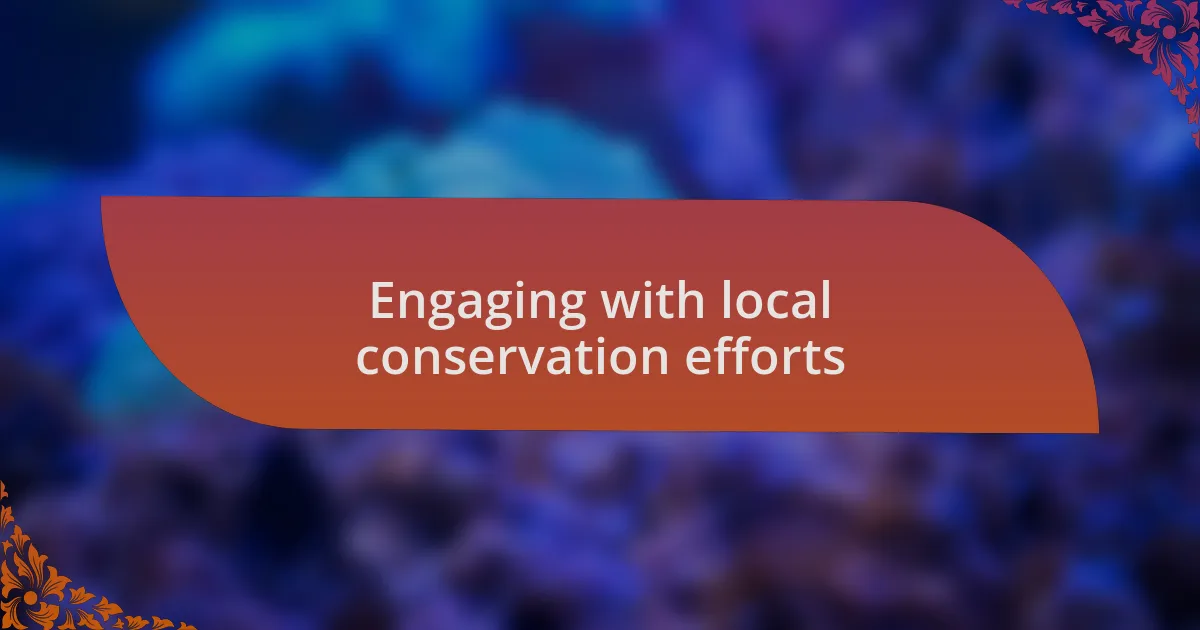
Engaging with local conservation efforts
Engaging with local conservation efforts often means immersing myself in community activities that prioritize the health of our oceans. I recall an event where I volunteered with a local organization to restore a mangrove habitat. The sense of purpose I felt while planting seedlings was incredible; it wasn’t just about the task at hand, but rather about contributing to a larger mission of supporting biodiversity. Have you ever taken part in something that felt so meaningful?
Additionally, I enjoy attending workshops that focus on marine education and conservation techniques. At one such workshop, I learned about the impact of climate change on coral reefs and how simple actions can mitigate these effects. Seeing others share their concerns and ideas was invigorating. Have you ever left a gathering feeling inspired to act, with new friends and allies to tackle these pressing issues together?
Moreover, partnering with local schools to promote ocean education has been a gratifying experience. I remember leading a session where we discussed plastic pollution with eager young minds. Their curiosity and passion reminded me of why I engage in these efforts; they’re the guardians of the ocean’s future. How often do we get the opportunity to inspire the next generation? Each engagement fosters hope and reinforces our shared commitment to conserving marine ecosystems.
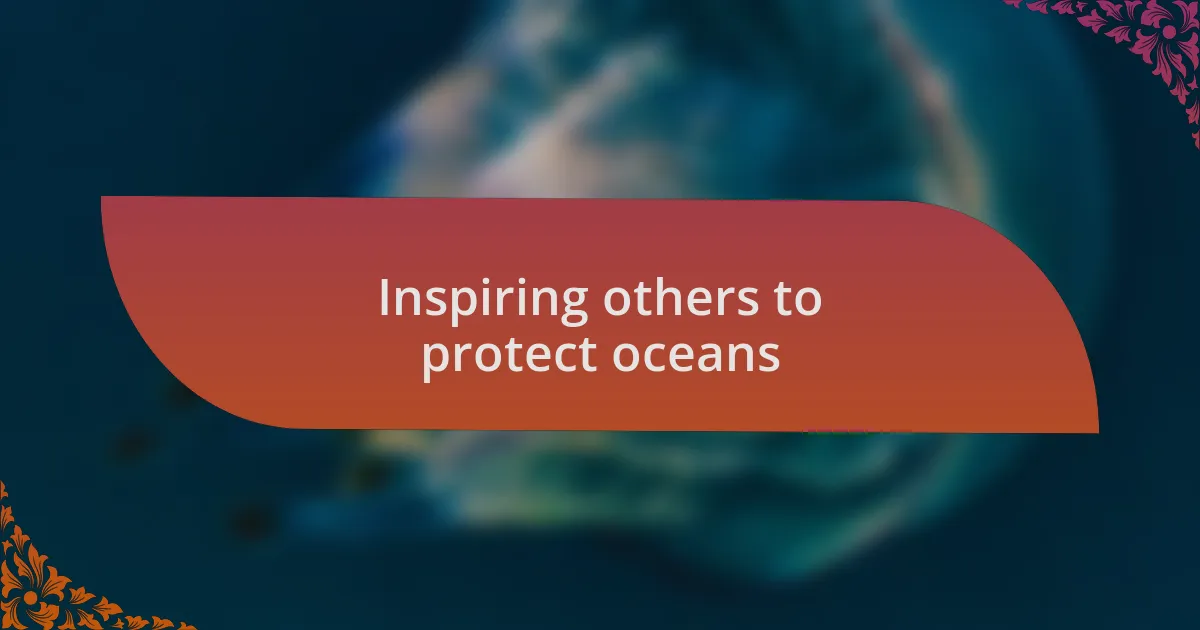
Inspiring others to protect oceans
In my experience, storytelling is one of the most powerful tools for inspiring others to protect our oceans. When I share personal encounters with marine wildlife—like the awe I felt when swimming alongside a majestic sea turtle—people often react with a newfound appreciation for these creatures. Have you ever noticed how a simple story can ignite a spark of curiosity and concern in others?
Social media has also become a crucial platform for raising awareness about ocean conservation. I remember posting pictures from a beach cleanup I organized, captioning not just the numbers of bags collected but also sharing the emotions tied to witnessing the before-and-after transformation of the shoreline. It struck me how quickly my small network of friends began to share their own cleanup stories and pictures. Isn’t it incredible how a single moment can become a ripple effect, motivating countless others to take action?
I find that engaging in discussions about local and global marine issues can really resonate with people. During a community gathering focused on ocean health, I opened up about my fears regarding plastic waste and its impact on marine life. The heartfelt responses I received—not only acknowledgment but also offers of ideas and solutions—reminded me that our voices matter. How often do we underestimate the effect of speaking out, even in a small circle? Each conversation can be a catalyst for change, inspiring others to join the fight against marine biodiversity loss.